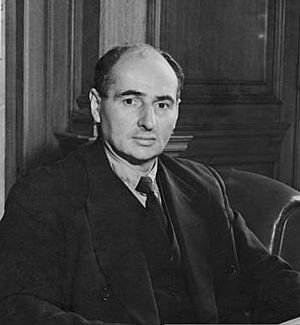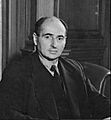John Strachey (politician) facts for kids
Quick facts for kids
John Strachey
|
|
|---|---|
 |
|
| Secretary of State for War | |
| In office 28 February 1950 – 26 October 1951 |
|
| Monarch | George VI |
| Prime Minister | Clement Attlee |
| Preceded by | Manny Shinwell |
| Succeeded by | Anthony Head |
| Minister of Food | |
| In office 27 May 1946 – 28 February 1950 |
|
| Preceded by | Sir Ben Smith |
| Succeeded by | Maurice Webb |
| Personal details | |
| Born | 21 October 1901 Guildford, Surrey, UK |
| Died | 15 July 1963 (aged 61) Marylebone, London, UK |
| Political party | Labour |
| Alma mater | Magdalen College, Oxford |
Evelyn John St Loe Strachey (born October 21, 1901 – died July 15, 1963) was a British politician and writer. He was a member of the Labour Party.
John Strachey started his career as a journalist. He was first elected to Parliament in 1929. He initially supported Oswald Mosley, who later became a leader of fascism in Britain. Strachey joined Mosley's new political group, the New Party, in 1931. However, he soon disagreed with Mosley and left the party. This meant he did not follow Mosley into fascism.
After losing his seat in 1931, Strachey became interested in Communism. He was a Communist sympathizer for much of the 1930s. He later broke away from the Communist Party in 1940.
During World War II, Strachey served as an officer in the Royal Air Force. He worked in planning and public relations. He was elected to Parliament again in 1945 as a Labour MP. He served in the government under Prime Minister Clement Attlee. He was the Minister of Food and later the Secretary of State for War. He remained a Labour MP until he died.
Throughout his life, Strachey wrote many books and articles. In the 1930s, he wrote from a Communist viewpoint. After World War II, his writings focused on social democracy, which is a mix of socialism and democracy.
Contents
Early Life and Education
John Strachey was born in Guildford, Surrey, England. His birthday was October 21, 1901. He was the youngest of three sons. His father, John St Loe Strachey, was the editor of a famous magazine called The Spectator.
Strachey went to Eton College, a well-known school, from 1915 to 1919. In 1920, he went to Magdalen College, Oxford at Oxford. While there, he helped edit a magazine called Oxford Fortnightly Review. He had to leave Oxford in 1922 because he became ill. He left without finishing his degree.
After leaving university, he started working for The Spectator magazine in 1922.
Political Journey
Starting in Politics
In 1923, John Strachey began writing for a publication called New Leader. This was for the Independent Labour Party.
He joined the Labour Party in 1923. In 1924, he tried to become a Member of Parliament (MP) for Birmingham Aston. He didn't win that election. He became a close friend and supporter of Oswald Mosley. Mosley was a rising politician in the Labour Party at the time.
In 1925, Strachey and Mosley wrote the "Birmingham Proposals." These ideas aimed to find better ways to deal with unemployment. Strachey also wrote a book called Revolution by Reason in 1925. It suggested ideas like printing more money and government planning.
Breaking with Mosley and Turning to Communism
In 1929, John Strachey became the MP for Birmingham Aston. He also worked as Oswald Mosley's private secretary in Parliament. In May 1930, both Mosley and Strachey resigned from their government roles. They were unhappy with how the government was handling unemployment.
In February 1931, Strachey helped Mosley start the New Party. However, Strachey left the party in July 1931. He disagreed with Mosley's new ideas, which were moving away from socialism. Mosley later went on to form a fascist party.
In the October 1931 election, Strachey lost his seat in Parliament. He ran as an independent candidate who supported Communist ideas. He even tried to join the Communist Party of Great Britain, but they did not accept him.
Fighting Fascism and Writing Books
In June 1934, Mosley's British Union of Fascists (BUF) held a large event in London. Many people protested against it, and there was violence. Strachey helped form a group called the Committee for Coordinating Anti-Fascist Activities. This group worked to oppose fascism.
Strachey also helped start the Left Book Club in 1936. This club published books that promoted left-wing ideas. He wrote many important books, including The Coming Struggle for Power (1932). His books helped explain Marxism to many English readers. He also wrote for a monthly newsletter called Left News.
World War II Service
By 1938, Strachey's ideas had changed. He became more interested in Keynesian economics, which focuses on government spending to manage the economy. He also liked the New Deal policies of American President Franklin D. Roosevelt.
In 1940, he published "A Programme for Progress." He became increasingly unhappy with the Communist movement. This was especially after the Molotov–Ribbentrop Pact (a non-aggression agreement between Germany and the Soviet Union) and the Soviet invasion of Finland. He publicly stated that he could no longer support the Communists. He officially left the Communist Party in April 1940.
Early in World War II, Strachey volunteered as an air raid warden. Later in 1940, he joined the Royal Air Force (RAF). He served as a squadron leader. He worked in public relations for the RAF. He became well-known for his broadcasts on the BBC. He talked about the brave airmen of RAF Bomber Command.
Government Roles After the War
Minister of Food
John Strachey rejoined the Labour Party. In 1943, he was chosen to be the Labour candidate for Dundee.
He was re-elected to Parliament in 1945. He immediately became the Under-Secretary of State for Air. In May 1946, he was appointed Minister of Food. He also became a Privy Counsellor that year.
His time as Minister of Food was very difficult. Britain still had food rationing after the war. This meant people could only buy limited amounts of food. Strachey had to introduce bread rationing, which was very unpopular. He explained that it was necessary because of a worldwide food shortage. He faced a lot of criticism for these policies. He also had to deal with the Tanganyika groundnut scheme, a plan to grow peanuts in Africa that did not go well.
Secretary of State for War
In February 1950, the Dundee constituency was divided. Strachey was elected as the Labour MP for Dundee West. He held this seat until his death in 1963.
He then became Secretary of State for War from 1950 to 1951. This role was not part of the main Cabinet at the time. His move to this new role was not a surprise, given how unpopular he had become at the Food Ministry. Strachey faced criticism because he had been a Communist sympathizer. This happened after the Klaus Fuchs Affair, where a scientist was found to be a spy.
During the 1950s, Strachey spent a lot of time writing. He wrote studies about British society from a social democratic point of view. He was against the Campaign for Nuclear Disarmament, which wanted to get rid of nuclear weapons.
Death
John Strachey passed away in Marylebone, London, on July 15, 1963. He was 61 years old. He died after having a spinal operation.
See also
- Strachey baronets
Images for kids


